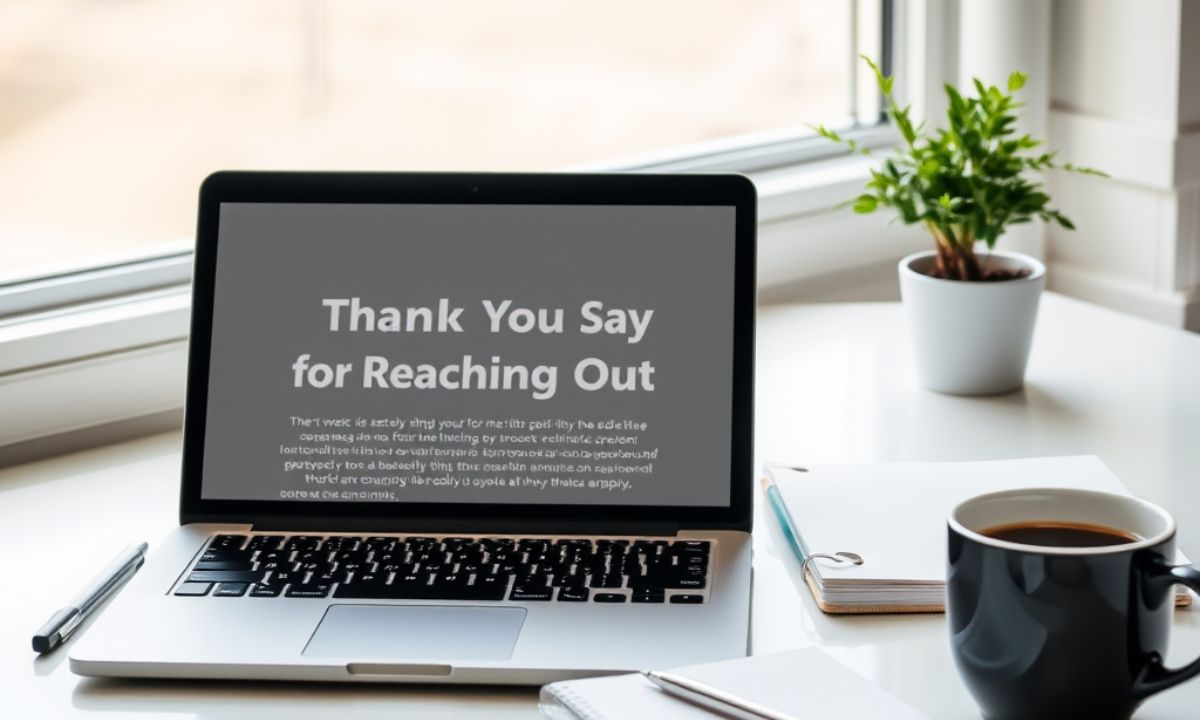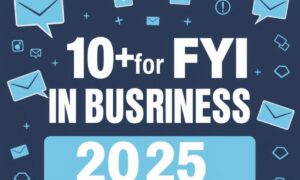This article provides you with alternatives to express “thank you for reaching out to me” to help you articulate your gratitude in various professional contexts.
Thanking others for reaching out to you is another hallmark of professional communication.
When you find diverse ways to appreciate the other person, you would likely enhance your professional relations, and undoubtedly, your communication will become more engaging.
READ MORE: https://travelloverage.com/someone-who-does-everything/
Appreciate Your Contacting Me
This phrase expresses respect for the initiative of the sender in maintaining a formal business tone. Appreciate is a more formal term than thanks and elevates the tone of your response in formal business communication.
This term works especially well in cases where somebody’s effort has been acknowledged and there is no need to be too friendly about it.
It positively emphasizes the upcoming discussions while also preserving professional space and showing your willingness to interact constructively around their message content.
Example: I truly appreciate your contacting me regarding the forthcoming project collaboration.
Grateful for Your Message
Expressing one’s gratitude for a message sent by someone indicates the complete appreciation of the effort put into communication.
This phrase works well for formal and semi-formal exchanges while lending warmth to your professional response.
Using the term “grateful” is more profound as far as appreciation is concerned over just a thank you, thus perfect for occasions when someone has shared important information or put in significant effort to reach out.
It helps build goodwill as well as a sweet ground for future communications.
Example: I am really grateful to you for your detailed message about the conference proceedings.
Thankful for Your Outreach
Thanking someone for their outreach is second nature for people who appreciate taking the initiative and the time to contact them.
This statement is ideal for networking situations where relationship building is prioritized. Accepting gratitude for their outreach means that one acknowledges the effort involved in the process of networking.
This statement effectively expresses gratitude to one who has gone to the first move of establishing a professional relationship or suggesting collaboration.
Example: I can only say that I am very grateful for your outreach related to the industry networking event.
Appreciation for Reaching Out
Your acknowledgement of someone reaching out demonstrates not only gratitude for their initiative but also respect for their effort. Here is a very adaptable phrase that works in various professional contexts and can be personalized to fit the occasion.
The appreciation extends to the communication and effort involved to contact.
This expression is relatively neutral in tone, which means it can be used in responses to potential clients, colleagues, or someone in the business world with whom one has a working relationship, making it a dependable expression in many trade communications.
Example: I want to express my appreciation for reaching out about the potential partnership.
Acknowledging Your Connection
Network building is at the heart of this sentence. In terms of applicability, it works especially well in connection with networking efforts or professional introductions.
There will be no doubt in the mind of your new associate that you intend to foster this budding relationship upon acknowledging the connection.
This phrase works best in the context of LinkedIn messages or professional introductions and other networking forms focused on relationship building.
Example: I am glad to acknowledge your invitation and look forward to the business relationship.
Find more words!
Being able to express gratitude in even more ways helps customize your response for different situations or audiences.
Having numerous ways to say thank you really helps quantify the tone of the expression according to the relationship and situational context.
When using alternative expressions, keep in mind factors such as degrees of formality, personal history with the person, and norms in your industry.
Using just the right words adds to your skills in communication and awareness of details, which further builds your credibility as a professional.
Example: I appreciate you taking the initiative to contact me regarding this matter.
Expressing Gratitude for Contact
Both reaching out and expressing genuine appreciation for the message are put in function here. Using this phrasing shows class, but still genuine thanks can be conveyed.
This is especially useful when replying to senior colleagues, prospective clients, or where the context requires respecting proper professional boundaries.
Example: I would like to formally thank you for your contact regarding this opportunity.
Recognition for Your Inquiry
This phrase specifically refers to a request or an inquiry, hence, it can be used in a customer service or another sort of information request response.
This acknowledges the fact, validates their query, and indicates that you pay attention to the asking.
This expression works best when someone has asked for information, for clarification, or assistance, as it directly pertains to the reason for their contact.
Using this phrasing gives an impression that you are keen on listening to their needs and can provide what they are seeking.
Example: Thank you for your acknowledgement of this inquiry about our new service offerings.
Thank You for Reaching Me
This somewhat more personal phrasing works well when the message itself and the fact that they reached you, in particular, are both acknowledged. It is effective as a reply to messages that took time or effort to reach you.
The phrase expresses gratitude toward the person along with an acknowledgment that connection with the right one is sometimes hard.
This can be said, especially if someone had to tread through various channels to reach you or when you’re actually the contact person they needed.
Example: Thank you for reaching me regarding the specialized consultation request.
Grateful for Your Communication
This expression directs attention to the communication itself and not merely the act of communicating.
It suffices to respond to messages that require lengthy communication, thereby expressing thanks for a message sent.
Gratefulness must be conveyed for having received the said communication since it acknowledges time and thought in writing it.
This phrase really counts when someone shares critical information with you, really goes into detail with providing feedback, or has taken considerable time narrating a message to you.
Example: Thanks a lot for writing to me at length regarding the project requirements.
Appreciate Your Touching Base
A little less formal for relationships that are sustained over time and whose intervals are filled with check-ins:
Touching base suggests a lighter, more routine form of communication, making this phrase suitable for those occasional contacts.
It recognizes a communication pattern while still showing gratitude for that engagement.
This expression works particularly well for responses to follow-ups, routine status updates, or hiatuses from colleagues or clients with whom you hold a well-established relationship.
Example: I appreciate your touching base about our ongoing collaboration—it’s always helpful.
Thanks for Reaching Out
Though short, this phrase is casual enough to fit most professional situations while maintaining a balance between formality and casualness.
It is perfect for conveying a hasty response or introducing a longer message by virtue of its brevity.
This phrase can be put to use in diverse settings and is quite easily common and understood from different parts of an industry and cultural context.
The simplicity of the expression, in fact, makes it a ready standby when you simply want an uncomplicated way to say that someone has taken the initiative.
Example: Thanks for getting in touch about the upcoming industry event-I am keen on attending.
Expressing Thanks for Contacting
The phrase underscores the act of contact and works well when someone has taken the initiative to communicate with you.
The slightly more formal phrase can give your response a little more elevation in professional settings.
By pointing to the action of their contacting you, you are recognizing their initiative and effort in making the connection.
This statement works especially well for first-time communications or when someone has done something special to get in contact with you.
Example: I appreciate that you reached out to me for this special opportunity.
Acknowledging Your Outreach
Such formal phrasing suits business-to-business communications or responding to professional solicitation, so it maintains adequate distances and appreciation.
To “acknowledge” something is more formal than just to thank; thus, it would find good use in formal business tome contexts as well.
This phrasing is mostly effective for use in answering sales queries, partnership proposals, or other professional solicitations that call for appropriate boundaries.
Example: I acknowledge your reaching out for at least potential services with interest.
Thankful for Your Correspondence
Such language is suitable to written communication, especially in long-standing business contexts or government correspondence. It conveys thanks quite formally for official correspondence.
Instead of saying ‘message’ or ’email,’ to state ‘correspondence’ hitches the level of tone and the nature of formality in which the communication is held.
It is most aptly set forth upon replying to any official letter, any kinds of formal business proposals, or communication within the categories with more traditional communication styles.
Example: I thank you for your correspondence regarding the coming up regulatory changes.
Appreciation for Your Email
This phrase takes into consideration email exchanges and is appropriate for modern business contexts wherein email remains the predominant channel of communication.
It refers to the medium while thanking them for their message. This unequivocal expression fits most business email replies and can be customized with more detail about the message they sent.
This phrase is specific enough to indicate that you are responding to their email communication and not an actual phone call or instant message through another channel.
Example: I want to express my appreciation for your email outlining the project timeline.
FAQ’s
Why is it important to vary expressions of gratitude in professional communication?
It avoids redundancy, shows attention to detail, and helps you shape your tone to different professional relationships.
Which phrase sounds better for formal business correspondence?
“I appreciate your contacting me” and “Thankful for your correspondence” maintain the formal tone while expressing gratitude.
How fast should someone acknowledge a professional reach-out?
A reply within 24 to 48 hours guarantees respect and professionalism toward the initiate.
Could these be applied to international business correspondence?
Only that uncomplicated phrases like, “Thanks for reaching out,” would be most international.
Should gratitude clauses be in all professional replies?
This must be a yes, as one should acknowledge someone’s reach-out at any time in professional correspondence before turning to the content of their inquiry..
Conclusion
The more you know about different ways to express gratitude in a professional setting, the better you will be able to operate as a communicator.
Whenever someone takes the time to contact you, recognizing that effort with thoughtful appreciation helps to build stronger professional relationships.
The specific words you choose should reflect the situation, your relationship with the person involved, and the formality level required.
Your deliberate approach toward expressing gratitude shows your ability to attend to detail and thus creates a deeper bond with your professionalism.
A proper expression of appreciation, when directed toward a client, colleague, or potential business partner, can create a conducive atmosphere for the rest of the engagement.

I’m Irfan, an experienced SEO content and SEO specialist with 2 years of expertise, currently contributing to Al Jazeera News Website.












